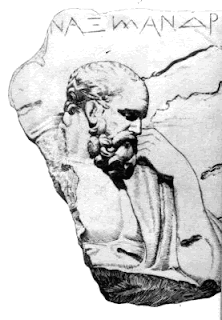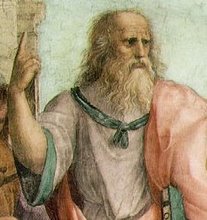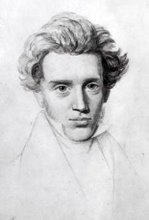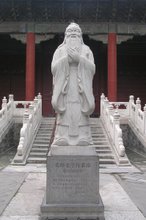The rise of the Golden Age of Chinese Philosophy came during a turbulent period in the history China. It began in what is known as the Spring and Autumn period and extended through the Warring States period. Most of the well-known Chinese philosophies come from this epoch. And as an interesting side note, it corresponds roughly to the same period in Classical Greek Philosophy. Over the next few entries I will be investigating the rise of this period in the philosophies of the East, looking into Confucius, Han Feizi, Laozi, and other notable figures from that era.
Sunday, September 9, 2007
Friday, September 7, 2007
Gorgias (487 BC - 376 BC)

Lifespan: born 487 BC - died 376 BC
Primary Base of Operations: Greek cities of Leontini and Attica
Schools of Thought: Sophism
Other Occupations: Rhetorician
Teacher: Empedocles
Primary Base of Operations: Greek cities of Leontini and Attica
Schools of Thought: Sophism
Other Occupations: Rhetorician
Teacher: Empedocles
- considered by many to be one of the founders of Sophism.
- Gorgias begins his argument by presenting a logical contradiction, "if the nonexistent exists, it will both exist and not exist at the same time" (a violation of the principle of non-contradiction). He then denies that existence (to on) itself exists, for if it exists, it is either eternal or generated. If it is eternal, it has no beginning, and is therefore without limit. If it is without limit, it is "nowhere", and hence does not exist. And if existence is generated, it must come from something, and that something is existence, which is another contradiction. Likewise, nonexistence (to mê on) cannot produce anything. The sophist then explains that existence can neither be "one" (hen) or "many" (polla), since if it were one, it would be divisible, and therefore not one. If it were many, it would be a "composite of separate entities" and no longer the thing known as existence.
- some call him the first nihilist.
- he remarked, "if things considered [imagined or thought] in the mind are not existent, the existent is not considered", that is to say, existence is incomprehensible.
- Gorgias begins his argument by presenting a logical contradiction, "if the nonexistent exists, it will both exist and not exist at the same time" (a violation of the principle of non-contradiction). He then denies that existence (to on) itself exists, for if it exists, it is either eternal or generated. If it is eternal, it has no beginning, and is therefore without limit. If it is without limit, it is "nowhere", and hence does not exist. And if existence is generated, it must come from something, and that something is existence, which is another contradiction. Likewise, nonexistence (to mê on) cannot produce anything. The sophist then explains that existence can neither be "one" (hen) or "many" (polla), since if it were one, it would be divisible, and therefore not one. If it were many, it would be a "composite of separate entities" and no longer the thing known as existence.
- some call him the first nihilist.
- he remarked, "if things considered [imagined or thought] in the mind are not existent, the existent is not considered", that is to say, existence is incomprehensible.
Saturday, August 25, 2007
Protagoras (490 BC - 420 BC)
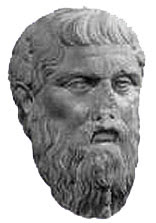
Lifespan: born 490 BC - died 420 BC
Primary Base of Operations: Greek cities of Abdura and Athens
Schools of Thought: Sophism and Ionian
Other Occupations: Scientist
Teacher: ?
Primary Base of Operations: Greek cities of Abdura and Athens
Schools of Thought: Sophism and Ionian
Other Occupations: Scientist
Teacher: ?
- "Man is the measure of all things: of things which are, that they are, and of things which are not, that they are not"
- "Concerning the gods, I have no means of knowing whether they exist or not or of what sort they may be, because of the obscurity of the subject, and the brevity of human life"
- attempted to formulate a reasoned understanding, on a very general level, of a wide range of human phenomena (for example, language and education). He also seems to have had an interest in orthoepeia, or the correct use of words.
- was also renowned as a teacher who addressed subjects connected to virtue and political life. He was especially involved in the question of whether virtue could be taught.
- many consider the main contribution of Protagoras to be his method of finding a better argument by discarding the less viable one. This is known as "Antilogies", and consists of two premises; the first is "Before any uncertainty two opposite theses can validly be confronted", the second is its complement: the need to "strengthen the weaker argument".
- "Concerning the gods, I have no means of knowing whether they exist or not or of what sort they may be, because of the obscurity of the subject, and the brevity of human life"
- attempted to formulate a reasoned understanding, on a very general level, of a wide range of human phenomena (for example, language and education). He also seems to have had an interest in orthoepeia, or the correct use of words.
- was also renowned as a teacher who addressed subjects connected to virtue and political life. He was especially involved in the question of whether virtue could be taught.
- many consider the main contribution of Protagoras to be his method of finding a better argument by discarding the less viable one. This is known as "Antilogies", and consists of two premises; the first is "Before any uncertainty two opposite theses can validly be confronted", the second is its complement: the need to "strengthen the weaker argument".
Wednesday, August 22, 2007
Zeno of Elea (490 BC - 430 BC)

Lifespan: born between 490 and 488 BC - died around 430 BC
Primary Base of Operations: Greek city of Elea
Schools of Thought: Eleatic
Other Occupations: Mathematician and physicist
Teacher: Parmenides
Primary Base of Operations: Greek city of Elea
Schools of Thought: Eleatic
Other Occupations: Mathematician and physicist
Teacher: Parmenides
- True Being is absolutely one; there is in it no plurality. True Being is absolutely static and unchangeable.
- Known most for his paradoxes:
- The flying arrow is at rest. At any given moment it is in a space equal to its own length, and therefore is at rest at that moment. So, it's at rest at all moments. The sum of an infinite number of these positions of rest is not a motion.
- Known most for his paradoxes:
- The flying arrow is at rest. At any given moment it is in a space equal to its own length, and therefore is at rest at that moment. So, it's at rest at all moments. The sum of an infinite number of these positions of rest is not a motion.
- If we assume that a line segment is composed of a multiplicity of points, then we can always bisect a line segment, and every bisection leaves us with a line segment that can itself be bisected. Continuing with the bisection process, we never come to a point, a stopping place, so a line cannot be composed of points.
- The many, the line, must be both limited and unlimited in number of points. It must be limited because it is just as many (points) as it is, no more, and less. It is therefore, a definite number, and a definite number is a finite or limited number. However, the many must also be unlimited in number, for it is infinitely divisible. Therefore, it's contradictory to suppose a line is composed of a multiplicity of points.
- The many, the line, must be both limited and unlimited in number of points. It must be limited because it is just as many (points) as it is, no more, and less. It is therefore, a definite number, and a definite number is a finite or limited number. However, the many must also be unlimited in number, for it is infinitely divisible. Therefore, it's contradictory to suppose a line is composed of a multiplicity of points.
Thursday, August 16, 2007
Empedocles (490 BC - 430 BC)

Lifespan: born between 492 and 490 BC - died between 432 and430 BC
Primary Base of Operations: Greek city of Agrigento
Schools of Thought: Pluralism and Pythagoreanism
Other Occupations: Poet and Mystic
Teacher: Pythagoras
Primary Base of Operations: Greek city of Agrigento
Schools of Thought: Pluralism and Pythagoreanism
Other Occupations: Poet and Mystic
Teacher: Pythagoras
- wrote his philosophy in epic verse.
- maintained in Pythagorean fashion that all matter is made up of four elements: water, earth, air and fire. Empedocles called these the four "roots"; the term "element", was used only by later writers.
- postulated something called Love (φιλία) to explain the attraction of different forms of matter, and of something called Strife (νεῖκος) to account for their separation. These ideas should not be confused with the four elements: if the elements are the content of the universe, then Love and Strife explain their variation and harmony.
- was also one of the first people to state the theory that light travels at a finite (although very large) speed.
- inventor of the study of rhetoric according to Aristotle.
- Like Pythagoras, he believed in the transmigration of the soul between humans and animals and followed a vegetarian lifestyle. He also propounded a theory of struggle in the animal kingdom that in some ways prefigures natural selection.
Tuesday, August 14, 2007
Anaxagoras (500 BC - 428 BC)
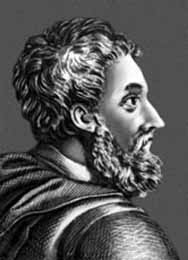
Lifespan: 500 BC - 428 BC
Primary Base of Operations: Greek cities of Lampsacus and Athens
Schools of Thought: Ionian
Other Occupations: Scientist
Teacher: ?
Primary Base of Operations: Greek cities of Lampsacus and Athens
Schools of Thought: Ionian
Other Occupations: Scientist
Teacher: ?
- All things have existed from the beginning. But originally they existed in infinitesimally small fragments of themselves, endless in number and inextricably combined. All things existed in this mass, but in a confused and indistinguishable form. There were the seeds (spermata) or miniatures of corn and flesh and gold in the primitive mixture; but these parts, of like nature with their wholes, had to be eliminated from the complex mass before they could receive a definite name and character. Mind arranged the segregation of like from unlike.
- Mind (Nous) as the initiating and governing principle of the cosmos.
- he contended that the sun was a fiery rock, this led to charges of impiety, and he was sentenced to death by the Athenian court. He avoided this penalty by leaving Athens, and he spent his remaining years in exile.
- thought everything contains a portion of everything else. His observation of how nutrition works in animals led him to conclude that in order for the food an animal eats to turn into bone, hair, flesh, and so forth, it must already contain all of those constituents within it.
Thursday, August 9, 2007
Some Useful Terms to Know #2
Doxa - meaning common belief or popular opinion (such as orthodoxy heterodoxy).
Aletheia - meaning truth, and implies sincerity, actuality, and reality.
Arete - in its basic sense means "goodness", 'excellence"or "virtue" of any kind. In its earliest appearance in Greek this notion of excellence was bound up with the notion of the fulfillment of purpose or function; the act of living up to one's full potential.
Aletheia - meaning truth, and implies sincerity, actuality, and reality.
Arete - in its basic sense means "goodness", 'excellence"or "virtue" of any kind. In its earliest appearance in Greek this notion of excellence was bound up with the notion of the fulfillment of purpose or function; the act of living up to one's full potential.
Parmenides (510 BC - 450 BC)

Lifespan: 510 BC - 450 BC
Primary Base of Operations: Greek city of Elea
Schools of Thought: Eleatic
Other Occupations: Poet
Teacher: Xenophanes (probably), and Ameinias
Primary Base of Operations: Greek city of Elea
Schools of Thought: Eleatic
Other Occupations: Poet
Teacher: Xenophanes (probably), and Ameinias
- believed every-day perception ofreality of the physical world is mistaken, and that the reality of the world is 'One Being': an unchanging, ungenerated, indestructible whole. Under 'way of seeming', Parmenides set out a contrasting but more conventional view of the world, thereby becoming an early exponent of the duality of appearance and reality. For him and his pupils the phenomena of movement and change are simply appearances of a static, eternal reality.
- truth cannot be known through sensory perception. Only pure reason(Logos) will result in the understanding of the truth of the world.
- argued against "nothingness"- denying the possibility of the void.
- thought nothing can have real existence but what is conceivable; therefore to be imagined and to be able to exist are the same thing, and there is no development. The essence of what is conceivable is incapable of development, imperishable, immutable, unbounded, and indivisible. What is various and mutable, all development, is a delusive phantom. Perception is thought directed to the pure essence of being; the phenomenal world is a delusion, and the opinions formed concerning it can only be improbable.
- argued against "nothingness"- denying the possibility of the void.
- thought nothing can have real existence but what is conceivable; therefore to be imagined and to be able to exist are the same thing, and there is no development. The essence of what is conceivable is incapable of development, imperishable, immutable, unbounded, and indivisible. What is various and mutable, all development, is a delusive phantom. Perception is thought directed to the pure essence of being; the phenomenal world is a delusion, and the opinions formed concerning it can only be improbable.
Wednesday, August 8, 2007
Xenophanes (570 BC - 480 BC)
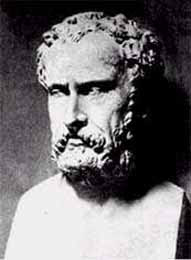
Lifespan: 570 BC - 480 BC
Primary Base of Operations: Greek city of Colophon
Schools of Thought: Eleatic
Other Occupations: Poet, Scientist
Teacher: Pythagoras (maybe)
Primary Base of Operations: Greek city of Colophon
Schools of Thought: Eleatic
Other Occupations: Poet, Scientist
Teacher: Pythagoras (maybe)
- he maintained there was only one god -- namely, the world. God is one incorporeal eternal being, and, like the universe, spherical in form; that he is of the same nature with the universe, comprehending all things within himself; is intelligent, and pervades all things, but bears no resemblance to human nature either in body or mind.
- he taught that if there had ever been a time when nothing existed, nothing could ever have existed. Whatever is, always has been from eternity, without deriving its existence from any prior principles.
- his position is often classified as pantheistic, although his use of the term 'god' simply follows the use characteristic of the early cosmologists generally. There is no evidence that Xenophanes regarded this 'god' with any religious feeling, and all we are told about him (or rather about it) is purely negative.
- he taught that if there had ever been a time when nothing existed, nothing could ever have existed. Whatever is, always has been from eternity, without deriving its existence from any prior principles.
- his position is often classified as pantheistic, although his use of the term 'god' simply follows the use characteristic of the early cosmologists generally. There is no evidence that Xenophanes regarded this 'god' with any religious feeling, and all we are told about him (or rather about it) is purely negative.
Wednesday, August 1, 2007
Pythagoras (580 BC - 490 BC)
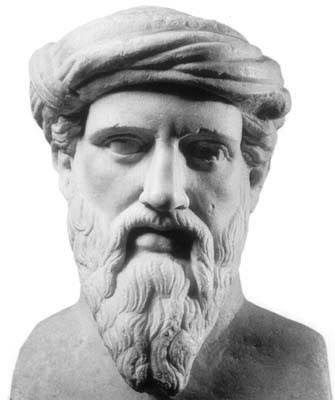
Lifespan: born between 580 and 572 BC - died between 500 and 490 BC
Primary Base of Operations: Greek city of Croton in southern Italy
Schools of Thought: Pythagoreanism, Ionian
Other Occupations: Mathematician, Mystic and Scientist
Teacher: Anaximander (maybe)
Primary Base of Operations: Greek city of Croton in southern Italy
Schools of Thought: Pythagoreanism, Ionian
Other Occupations: Mathematician, Mystic and Scientist
Teacher: Anaximander (maybe)
- claimed men may be classified accordingly as lovers of wisdom, lovers of honor, and lovers of gain.
- believed in transmigration, or the reincarnation of the soul again and again into the bodies of humans, animals, or vegetables until it became moral. His ideas of reincarnation were influenced by Greek Mythology. He was one of the first to propose that the thought processes and the soul were located in the brain and not the heart. He himself claimed to have lived four lives that he could remember in detail, and heard the cry of his dead friend in the bark of a dog.
- established a secret religious society very similar to (and possibly influenced by) the earlier Orphic Cults. He opened his school to male and female students alike. Those who joined the inner circle of Pythagoras's society called themselves the Mathematikoi. They lived at the school, owned no personal possessions and were required to assume a vegetarian diet.
- Iamblichus claimed Pythagoras once said that "number is the ruler of forms and ideas and the cause of gods and demons."
Tuesday, July 31, 2007
Anaximenes (585 BC - 525 BC)
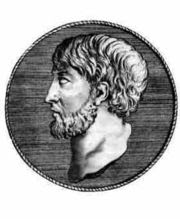
Lifespan: 585 BC - 525 BC
Primary Base of Operations: Greek city of Miletos, on the coast of Asia Minor (modern day Turkey)
Schools of Thought: Milesian School, Ionians, Naturalism
Other Occupations: Cosmologist
Teacher: Anaximander
Primary Base of Operations: Greek city of Miletos, on the coast of Asia Minor (modern day Turkey)
Schools of Thought: Milesian School, Ionians, Naturalism
Other Occupations: Cosmologist
Teacher: Anaximander
- held that the air, with its variety of contents, its universal presence, its vague associations in popular fancy with the phenomena of life and growth, is the source of all that exists. Everything is air at different degrees of density, and under the influence of heat, which expands, and of cold, which contracts its volume, it gives rise to the several phases of existence. (It was actually "aer" which he believed to be the common charecteristic between all things. "Aer" is the Greek word for a mist rather than just pure air.)
- uses his principles to account for various natural phenomena. Lightning and thunder result from wind breaking out of clouds; rainbows are the result of the rays of the sun falling on clouds; earthquakes are caused by the cracking of the earth when it dries out after being moistened by rains. He gives an essentially correct account of hail as frozen rainwater.
- uses his principles to account for various natural phenomena. Lightning and thunder result from wind breaking out of clouds; rainbows are the result of the rays of the sun falling on clouds; earthquakes are caused by the cracking of the earth when it dries out after being moistened by rains. He gives an essentially correct account of hail as frozen rainwater.
Anaximander (610 BC - 546 BC)
Primary Base of Operations: Greek city of Miletos, on the coast of Asia Minor (modern day Turkey)
Schools of Thought: Milesian School, Ionians, Naturalism
Other Occupations: Mathematician, Astronomer, Cartographer
Teacher: Thales
Schools of Thought: Milesian School, Ionians, Naturalism
Other Occupations: Mathematician, Astronomer, Cartographer
Teacher: Thales
- understood the beginning or first principle to be an endless, unlimited primordial mass (apeiron), subject to neither old age nor decay, that perpetually yielded fresh materials from which everything we perceive is derived.
- postulated the apeiron as a substance that, although not directly perceptible to us, could explain the opposites he saw around him.
- according to him, the Universe originates in the separation of opposites in the primordial matter. It embraces the opposites of hot and cold, wet and dry, and directs the movement of things; an entire host of shapes and differences then grow that are found in "all the worlds" (for he believed there were many).
- taking into account the existence of fossils, he claimed that animals sprang out of the sea long ago. The first animals were born trapped in a spiny bark, but as they got older, the bark would dry up and break. As the early humidity evaporated, dry land emerged and, in time, humankind had to adapt.
- according to him, the Universe originates in the separation of opposites in the primordial matter. It embraces the opposites of hot and cold, wet and dry, and directs the movement of things; an entire host of shapes and differences then grow that are found in "all the worlds" (for he believed there were many).
- taking into account the existence of fossils, he claimed that animals sprang out of the sea long ago. The first animals were born trapped in a spiny bark, but as they got older, the bark would dry up and break. As the early humidity evaporated, dry land emerged and, in time, humankind had to adapt.
Wednesday, July 25, 2007
Thales (624 BC - 546 BC)

Lifespan: 624 BC - 546 BC
Primary Base of Operations: Greek city of Miletos, on the coast of Asia Minor (modern day Turkey)
Schools of Thought: Milesian School, Ionians, Naturalism
Other Occupations: Business Owner (Olive Presses), Mathematician, Astronomer
Primary Base of Operations: Greek city of Miletos, on the coast of Asia Minor (modern day Turkey)
Schools of Thought: Milesian School, Ionians, Naturalism
Other Occupations: Business Owner (Olive Presses), Mathematician, Astronomer
- considered by any to be the first philosopher of the Western tradition and the "father of science", also one of the Seven Sages of Greece.
- recognizes a transcendental God, who has neither beginning nor end.
- believed men are better than women and Greeks are better than barbarians.
- attempted to explain events in the world through nature rather than the gods.
- believed the world originated in water.
- attributed by many to be the first to articulate the idea of "being" (the arche) and "becoming" (the world we see). The arche to Thales was water that made all things.
Tuesday, July 24, 2007
Some Useful Terms to Know #1
Arche - First articulated in Western Philosophy by Thales, it is the beginning or founding principle of the world (Thales thought it to be water).
Eidos - Used extensively by Plato, this term means form or shape or image.
Teleology - The philosophical study of design, purpose, directive principle, or finality of nature or human creations (of utmost importance to Aristotle).
Eidos - Used extensively by Plato, this term means form or shape or image.
Teleology - The philosophical study of design, purpose, directive principle, or finality of nature or human creations (of utmost importance to Aristotle).
Subscribe to:
Posts (Atom)
